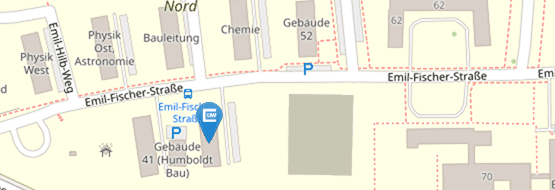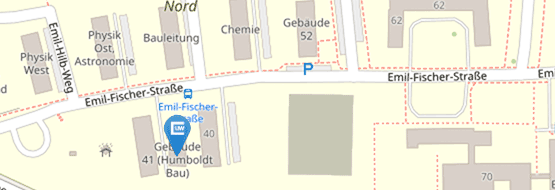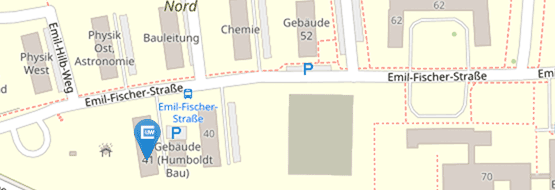Lehrveranstaltungen
Aktuelle Lehrveranstaltungen
Master Studienfeld Mathematik:
- Riemannsche und Pseudo-Riemannsche Geometrie, 4 St., Di 12-14 S1.101, Mi 12-14 S0.106, Ratzkin J.
- Übungen zu Riemannsche und Pseudo-Riemannsche Geometrie, 2 St., nach Absprache, Ratzkin J.
- Giovanni Prodi Lecture: Topics in Nonlinear Partial Differential Equations, 4 St., Mo 10-12 S1.101, Di 10-12 S1.104, Wei J.
- Giovanni Prodi Lecture: Exercises for Topics in Nonlinear Partial Differential Equations, 2 St., nach Absprache, Wei J.
- Research in Groups - Mathematics in the Sciences (Mathematical Analysis of PDEs in Fluid-Structure Interaction), Thursdays 10-12 SE 40 and 2 hours on agreement, Schlömerkemper A., Sabbagh, L.
Bachelor
- Einführung in Partielle Differentialgleichungen, 4 St., Do 14-16 S0.106 ; Fr 10-12 S1.101, Ratzkin J.
- Übungen zur Einführung in Partielle Differentialgleichungen, 2 St., Fr 14-16 S0.102, Ratzkin J.
Lehramt an Grund-, Mittel- und Realschulen (Unterrichtsfach)
- Analysis in mehreren Variablen (Grundlagen der Analysis 2), 2 St., Mi 14-16 S0.108, De Anna F.
- Übungen zur Analysis in mehreren Variablen (Grundlagen der Analysis 2), in Gruppen, 2 St., Do 14-16 S0.101 ; Fr 10-12 S0.102, De Anna F.
- Oberseminar in den Naturwissenschaften, siehe unter Veranstaltungen.
Vergangene Lehrveranstaltungen
Bachelor und Lehramtsveranstaltungen:
- Analysis in einer Variablen (Grundlagen der Analysis 1), De Anna F.
- Übungen zur Analysis in einer Variablen (Grundlagen der Analysis 1), De Anna F.
- Repetitorium (Aufgaben zur Linearen Algebra, GMR), De Anna F.
Mathematik für Informatiker:
- Mathematik für Informatiker, J. Ratzkin
- Übungen zur zur Mathematik für Informatiker 2, J. Ratzkin, Hofmann S., Pfarr E.
Seminare:
-
Oberseminar Mathematik in den Naturwissenschaften, nach Ankündigung
Master Studienfeld Mathematik:
-
Riemannsche und Pseudo-Riemannsche Geometrie, Ratzkin J.
-
Übungen zu Riemannsche und Pseudo-Riemannsche Geometrie, Ratzkin J
-
Calculus of Variations (Giovanni Prodi Lecture), Stroffolini B.
-
Exercises for Calculus of Variations (Giovanni Prodi Lecture), Stroffolini B.
Bachelor und Lehramtsveranstaltungen:
-
Einführung in die Geometrische Analysis, 4St., Ratzkin J
-
Übungen zur Einführung in die Geometrische Analysis, Ratzkin J., Kortum J.
Lehramt an Gymnasien:
Mathematik für Informatiker:
-
Mathematik für Informatiker, J. Ratzkin
-
Übungen zur zur Mathematik für Informatiker 2, J. Ratzkin, Hofmann S., Pfarr E.
Seminare:
-
Oberseminar Mathematik in den Naturwissenschaften, nach Ankündigung
Master Studienfeld Mathematik:
-
Nicht-lineare Analysis, F. De Anna
-
Übungen zu Nicht-lineare Analysis, F. De Anna
Mathematik für Informatiker:
-
Mathematik für Informatiker 1, J. Ratzkin
-
Übungen zur zur Mathematik für Informatiker 1, J. Ratzkin
Seminare:
-
Oberseminar Mathematik in den Naturwissenschaften, nach Ankündigung
-
Seminar Mathematik in den Naturwissenschaften, nach Ankündigung
- Analysis in einer Variablen (Grundlagen der Analysis 2), Dr. Francesco De Anna
- Einführung in Partielle Differentialgleichungen, Dr. Jesse Ratzkin
- Mathematik für Informatiker, Dr. Jesse Ratzkin
- Oberseminar Mathematik in den Naturwissenschaften, nach Ankündigung
- Seminar Mathematik in den Naturwissenschaften, nach Ankündigung
- Nichtlineare Analysis (Navier-Stokes equations), Prof. Anja Schlömerkemper
- Analysis in einer Variablen (Grundlagen der Analysis 1), Dr. Francesco De Anna
- Vertiefung Mathematik (Realschule), Dr. Jesse Ratzkin
- Mathematik für Informatiker, Dr. Jesse Ratzkin
- Oberseminar Mathematik in den Naturwissenschaften, nach Ankündigung
- Geometrische Analysis, Dr. Jesse Ratzkin
- Mathematik für Informatiker, Dr. Jesse Ratzkin
- Oberseminar Mathematik in den Naturwissenschaften, nach Ankündigung
- Master Seminar Mathematik in den Naturwissenschaften "Sustainability", Prof. Anja Schlömerkemper
- Mathematik für Informatiker, Dr. Jesse Ratzkin
- Oberseminar Mathematik in den Naturwissenschaften, nach Ankündigung
- Mathematische Grundlagen für ein MINT-Studium (Orientierungsstudium), Prof. Anja Schlömerkemper
- Seminar Homogenisierungstheorie und Mehrskalenmethoden / Seminar Mathematik in den Naturwissenschaften, Prof. Anja Schlömerkemper
- Oberseminar Mathematik in den Naturwissenschaften, nach Ankündigung
- Analysis in einer Variablen (Grundlagen der Analysis 1), Prof. Dr. Anja Schlömekemper
- Mathematische Kontinuumsmechanik, [M,CM,MP], Prof. Dr. Anja Schlömerkemper
- Mathematische Grundlagen für ein MINT-Studium (Orientierungsstudium), Prof. Anja Schlömerkemper
- Oberseminar Mathematik in den Naturwissenschaften, nach Ankündigung
-
Lineare partielle Differentialgleichungen und nichtlineare partielle Differentialgleichungen erster Ordnung, Dozentin: Prof. Dr. Anja Schlömerkemper, Assistent: Francesco De Anna (Orientierung Teil I des Lehrbuches von L.C. Evans, Partial Differential Equations)
- Seminar: Fixpunktsätze und ihre Anwendungen, Dozentin: Prof. Dr. Anja Schlömerkemper (Orientierung Kapitel 1 von Eberhard Zeidler, Applied Functional Analysis, Vol. 108
- Oberseminar Mathematik in den Naturwissenschaften, nach Ankündigung
- Einführung in die Funktionalanalysis, Dozentin: Prof. Dr. Anja Schlömerkemper
- Übungen zur Einführung in die Funktionalanalysis, Dozentin: Prof. Dr. Anja Schlömerkemper, Assistent: Joshua Kortum
- Oberseminar Mathematik in den Naturwissenschaften, nach Ankündigung
- Vertiefung Analysis, Dozentin: Prof. Dr. Anja Schlömerkemper, AssistentInnen: Joshua Kortum und PhD Jesse Ratzkin
- Research in Groups: Calculus of Variations, Dozentin: Prof. Dr. Anja Schlömerkemper
- Analysis II, Dozentin: Prof. Dr. Anja Schlömerkemper, AssistentInnen: Joshua Kortum, Laura Lauerbach und PhD Jesse Ratzkin
- Die Übungsblätter, kurze Lösungshinweise zu den Aufgaben sowie weitere allgemeine Hinweise zur Vorlesung finden Sie unter WueCampus (Kurs: WS18_Analysis2). Die Vorlesung orientiert sich hauptsächlich an Tretter, Christiane: Analysis II, Birkhäuser 2013
- Oberseminar Mathematik in den Naturwissenschaften (Details und Vortragende hier)
- Please notice the lecture series and seminar by Prof. Š. Nečasová on Compressible Navier-Stokes equations and fluid-structure interactions.
- Partielle Differentialgleichungen der mathematischen Physik
Das Thema dieser Vorlesungsreihe ist die mathematische Analyse der Navier-Stokes-Gleichungen. Diese Gleichungen modellieren die Bewegung viskoser Flüssigkeiten. Sie werden zur Modellierung von Wetter, Luftströmung um einen Flügel, Meeresströmungen, Strömung viskoelastischer Materialien und vielem mehr verwendet. Trotz ihres breiten Anwendungsbereichs gibt es immer noch große offene mathematische Probleme. Es ist noch nicht bewiesen, dass es in drei Dimensionen immer Lösungen gibt. Falls Lösungen existieren, ist nicht bekannt, ob sie keine Singularitäten enthalten. Dies sind die Existenz- und Glätteprobleme von Navier-Stokes, die vom Clay Mathematical Institute als Teil der Millennium-Probleme erwähnt wurden. In diesem Kurs werden wir wichtige Ergebnisse in der mathematischen Theorie der dreidimensionalen Navier-Stokes-Gleichungen diskutieren. Die Vorlesungsreihe basiert auf der jüngsten Monographie von Robinson, Rodrigo and Sadowski: The Three-Dimensional Navier-Stokes Equations, Cambridge University Press, 2016, insbesondere Kapitel 1-8. Das Buch ist als E-Book in der Bibliothek der Universität Würzburg erhältlich.
Voraussetzungen: Grundlagen der Funktionsanalyse und partielle Differentialgleichungen. Ich möchte mich nur an das erinnern, was in den Abschnitten 1.1-1.8 geschrieben steht. Wenn Sie die Lebesgue- und Sobolev-Räume nicht kennen, ist es hilfreich, diese vor Beginn des Semesters zu studieren.
- Master- / Forschungsseminar Mathematik in den Naturwissenschaften
Zusammen mit Prof. B. Zwicknagl, Thema: Variations- und Anwendungsrechnung, für weitere Informationen klicken Sie hier.
- Oberseminar Mathematik in den Naturwissenschaften (Details und Referenten hier)
Wintersemester 2016/17
- Research in Groups (Arbeitsgemeinschaft) on "Calculus of Variations: the vectorial case".
Topics include lower semicontinuity of integral functionals, relaxed variational problems, notions of polyconvexity, quasiconvexity and rank-one convexity, Gamma-convergence methods etc. The focus of this Research in Groups will be on analytical methods and concepts. Nevertheless, all these mathematical topics have interesting real-world applications in nonlinear elasticity, micromagnetic materials or so-called smart materials, which I will be happy to tell more about or which can be a topic of master theses. Of course, also the analytical topics discussed can form the basis of master (or bachelor) theses.
Prerequisites: Basics of measure theory and functional analysis, in particular weak convergence and Sobolev spaces.
A preliminary discussion has already taken place, in which we fixed the schedule and organizational details of this Research in Groups. There will be a lecture series in SE 30 on Thursdays 10-12. There will be a blockseminar for the student's talk.
Please contact me if you are interested in joining this Research in Groups but happen not to have attended the preliminary discussion. If you prefer to attend a Seminar (Bachelor or Master) on this topic instead of the Research in Groups, please let me know so that we can discuss how this can be done.
- Oberseminar Mathematik in den Naturwissenschaften (details and speakers here)
Sommersemester 2016
- Nonlinear Analysis (Nichtlineare Analysis). An introduction to the calculus of variations.
- Bachelorseminar Partielle Differentialgleichungen
- Oberseminar Mathematik in den Naturwissenschaften (details and speakers here)
Wintersemester 2015/16
- Einführung in die Funktionalanalysis
- Bachelorseminar Grundlagen der Navier-Stokes-Gleichungen bzw. der Analysis elastischer Festkörper und deren Mikrostrukturen
- Research in Groups/Seminar Mathematics in the Sciences
- Masterseminar Minimal Surfaces and Harmonic Maps (jointly with Prof. Roth and Prof. Waldmann),
first meeting in S1.101 on Monday, 12 October, 2:15 pm - Oberseminar Mathematik in den Naturwissenschaften (details and speakers here)
Sommersemester 2015
- Seminar Mathematische Modellierung
- Seminar Nichtlineare partielle Differentialgleichungen (Mathematik in den Naturwissenschaften)
- Oberseminar Mathematik in den Naturwissenschaften (details and speakers here)
Wintersemester 2014/2015 [Sabbatical / Forschungssemester]
Sommersemester 2014
- Vorlesung Analysis 2, 4 St., Mi, Do 10-12 in Turing-HS
- Seminar Mathematik in den Naturwissenschaften, Vorbesprechung am Dienstag, 8.4.14 um 14:15 Uhr in SE 40
- Oberseminar Mathematik in den Naturwissenschaften (details and speakers here)
Wintersemester 2013/2014
- Winter school on Calculus of Variations in Physics and Materials Science (10.-14.02.2014)
- Vorlesung Analysis I
- Arbeitsgemeinschaft Mathematik in den Naturwissenschaften
- Seminar Mathematik in den Naturwissenschaften (in die Arbeitsgemeinschaft integriert)
- Oberseminar Mathematik in den Naturwissenschaften (details and speakers here)
Sommersemester 2013
- Vorlesung Mathematische Kontinuumsmechanik mit Übung
- Oberseminar Mathematik in den Naturwissenschaften (details and speakers here)
Sommersemester 2012
- Mathematik für Studierende der Physik und Informatik 2
- Bachelor-Seminar Variationsrechnung
- Oberseminar Mathematik in den Naturwissenschaften (details and speakers here)
Wintersemester 2011/12
- Winter school on Calculus of Variations in Physics and Materials Science (08.-13.01.2012)
- Mathematik für Studierende der Physik und Informatik 1
- Arbeitsgemeinschaft Mathematik in den Naturwissenschaften
- Oberseminar Mathematik in den Naturwissenschaften (details and speakers here)
Sommersemester 2011
- Einführung in die Variationsrechnung
- Seminar Mathematische Modellierung
- Oberseminar Mathematik in den Naturwissenschaften (details and speakers here)
Winter semester 2016/17
- Research in Groups (Arbeitsgemeinschaft) on "Calculus of Variations: the vectorial case".
Topics include lower semicontinuity of integral functionals, relaxed variational problems, notions of polyconvexity, quasiconvexity and rank-one convexity, Gamma-convergence methods etc. The focus of this Research in Groups will be on analytical methods and concepts. Nevertheless, all these mathematical topics have interesting real-world applications in nonlinear elasticity, micromagnetic materials or so-called smart materials, which I will be happy to tell more about or which can be a topic of master theses. Of course, also the analytical topics discussed can form the basis of master (or bachelor) theses.
Prerequisites: Basics of measure theory and functional analysis, in particular weak convergence and Sobolev spaces.
A preliminary discussion has already taken place, in which we fixed the schedule and organizational details of this Research in Groups. There will be a lecture series in SE 30 on Thursdays 10-12. There will be a blockseminar for the student's talk.
Please contact me if you are interested in joing this Research in Groups but happen not to have attended the preliminary discussion. If you prefer to attend a Seminar (Bachelor or Master) on this topic instead of the Research in Groups, please let me know so that we can discuss how this can be done.
- Oberseminar Mathematik in den Naturwissenschaften (details and speakers here)
Sommersemester 2016
- Nonlinear Analysis (Nichtlineare Analysis). An introduction to the calculus of variations.
- Bachelorseminar Partielle Differentialgleichungen
- Oberseminar Mathematik in den Naturwissenschaften (details and speakers here)
Winter term 2015/16
- Einführung in die Funktionalanalysis
- Bachelorseminar Grundlagen der Navier-Stokes-Gleichungen bzw. der Analysis elastischer Festkörper und deren Mikrostrukturen
- Research in Groups/Seminar Mathematics in the Sciences
- Masterseminar Minimal Surfaces and Harmonic Maps (jointly with Prof. Roth and Prof. Waldmann),
first meeting in S1.101 on Monday, 12 October, 2:15 pm - Oberseminar Mathematik in den Naturwissenschaften (details and speakers here)
Sommersemester 2015
- Seminar Mathematische Modellierung
- Seminar Nichtlineare partielle Differentialgleichungen (Mathematik in den Naturwissenschaften)
- Oberseminar Mathematik in den Naturwissenschaften (details and speakers here)






